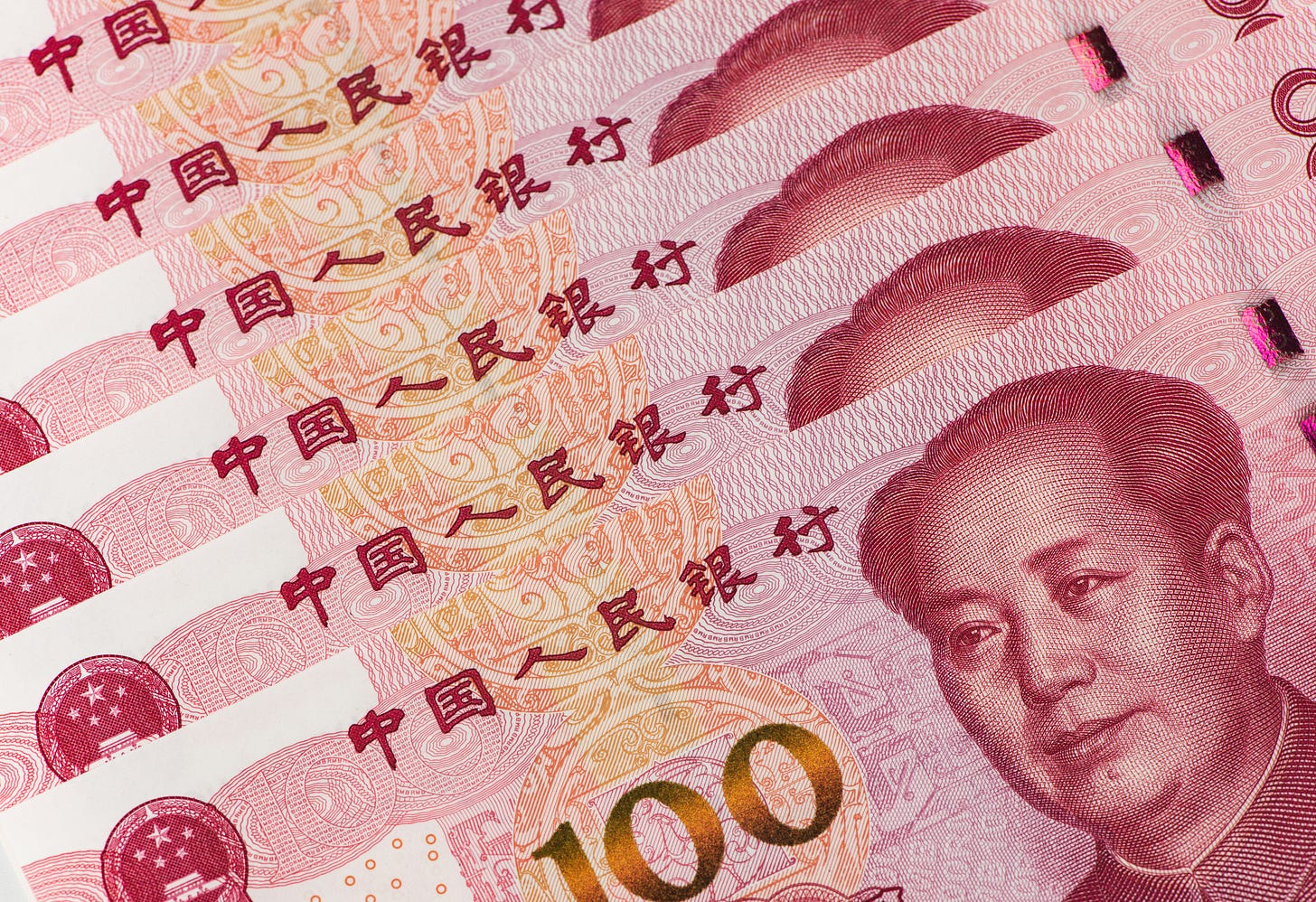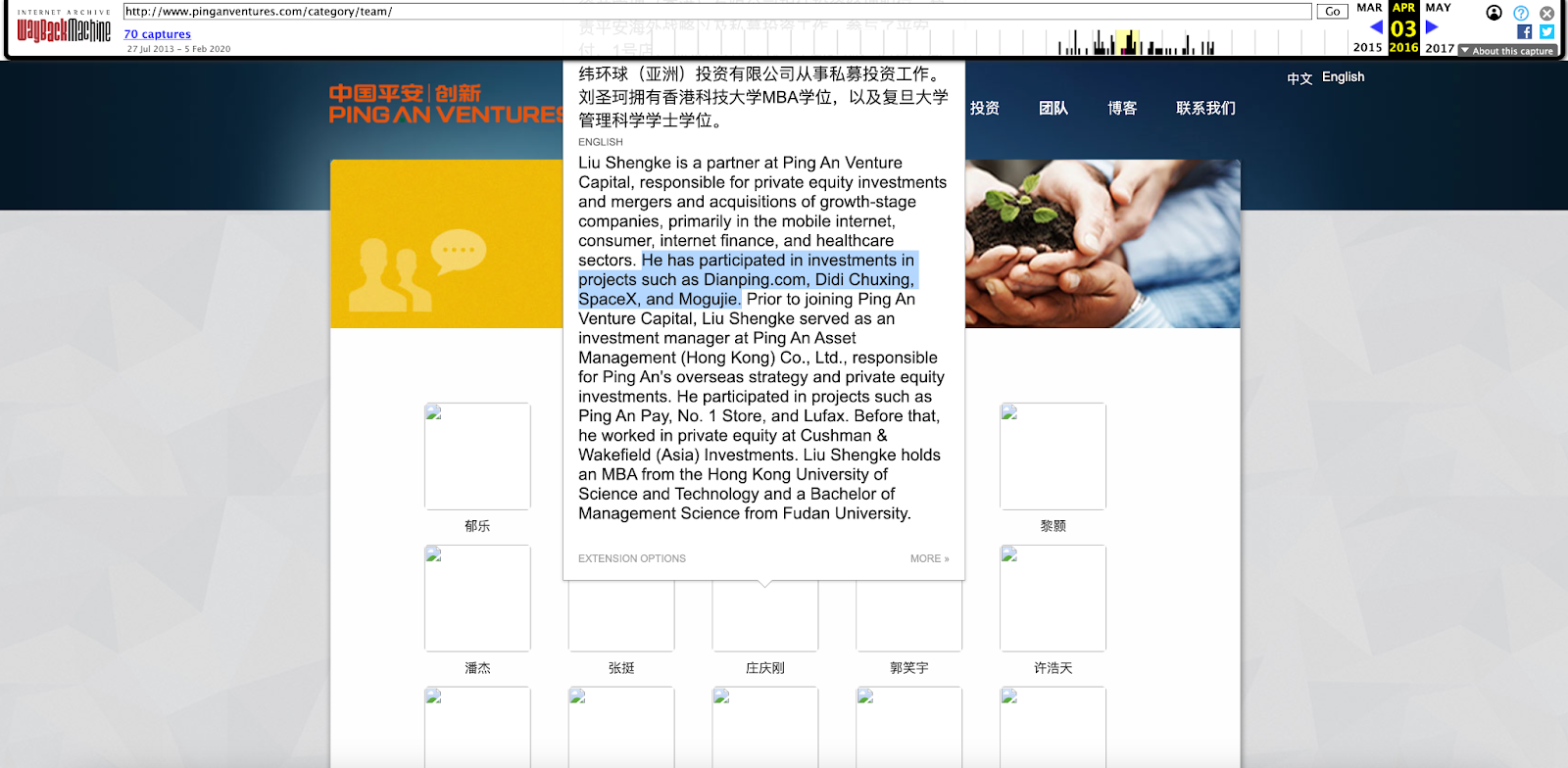One of China's largest companies claimed to have purchased a stake in Elon Musk's SpaceX, a vital U.S. defense contractor.
Ping An Ventures, an investment arm of the partially state-owned Ping An Group, publicized its stake in SpaceX in April 2016, according to archived pages of the firm's Mandarin-language website. The investment in Musk's rocket and satellite internet company has not been previously reported.
The percentage of SpaceX acquired by Ping An was not made public, and it's unclear whether the firm is privy to the internal financial statements and corporate documents typically provided to shareholders. It is also possible that Ping An divested its stake in SpaceX at some point since 2016.
SpaceX and Ping An Ventures did not respond to requests for comment.
Ping An disclosed its investment in SpaceX at a time when President Xi Jinping was calling for Chinese firms to win the burgeoning tech race by gaining access to more advanced Western technologies and building relationships with American companies. In 2016, as part of its Five-Year Plans, China’s State Council urged the country's aerospace sector to "[d]evelop fast, inexpensive, reusable, small-load, and space-to-earth transportation systems" — duplicating what SpaceX had first accomplished in December 2015.
SpaceX has since become the most valuable privately held company in the world. It was valued at around $10 billion in 2016, with $1.2 billion raised from investors. As of July 2025, SpaceX was seeking a share sale that would value the company at $400 billion, according to Bloomberg.
SpaceX’s massive valuation has been fueled by significant work for the federal government, including at least $22 billion in contracts from the Department of Defense and NASA. SpaceX also reportedly won a classified $1.8 billion contract with the National Reconnaissance Office last year to develop a network of sophisticated spy satellites. In March, it won a separate contract worth $5.9 billion as part of the Pentagon's National Security Space Launch program.
The company has sought to distance itself from Chinese investors, believing that their capital could jeopardize its ability to secure U.S. defense contracts, while SpaceX executives have warned that Chinese investments could draw scrutiny from the federal committee that reviews foreign investments for potential national security threats.
In May, House Democrats issued a letter to Defense Secretary Pete Hegseth urging him to investigate "conflicts of interest" and "potential obfuscation regarding investment by Chinese investors into SpaceX."
Ping An was once owned by the CPC
Launched in 2012, Ping An Ventures is the private equity and venture capital arm of the Shenzhen-based Ping An Group, one of China's most valuable companies. At its founding, Ping An Group, the largest insurer in China, was owned by the Communist Party of China. State-owned entities remain among its top investors today.
Ping An Ventures claimed to have purchased a stake in SpaceX in an archived version of the fund's website. The investment was purportedly led by the fund's former executive general manager, Liu Shengke, also known as Lance Liu in English. The following text is a Google translation of Liu's employee biography captured by the Internet Archive on April 3, 2016:
Liu Shengke is a partner of Ping An Ventures, responsible for private equity investment and mergers and acquisitions of growth-stage companies, mainly in the fields of mobile Internet, consumption, Internet finance and healthcare. Liu Shengke has participated in the investment of projects such as Dianping, Didi Chuxing, SpaceX, and Mogujie.
Before joining Ping An Ventures, Liu Shengke worked as an investment manager at Ping An Asset Management (Hong Kong) Co., Ltd., responsible for Ping An's overseas strategy and private equity investment, and participated in projects such as Ping An Pay, No. 1 Store, and Lufax.
Liu's LinkedIn profile indicates that he left Ping An in 2020 for WeVest, a company that has described itself as an "emerging financial advisory firm founded by industry veterans who have led numerous star projects such as… SpaceX, Mogujie, 58 Daojia, and X.D. Network," according to a Google translation. Liu was also cited in Delaware court filings related to an attempt by another Chinese investor to purchase SpaceX shares.
While the precise date of Ping An's investment in SpaceX is unclear, the firm had billions of dollars to invest in 2016, when it disclosed the stake. That year, according to the investment hub Crunchbase, Ping An invested £2.4 billion in Global Switch, a London-based data center giant; $400 million in Oscar Health, a U.S. health insurance company cofounded by Jared Kushner's brother; and $260 million in a Chinese drug developer.
Other Western companies have faced scrutiny over ties to Ping An, including HSBC, a London-based banking giant that counts Ping An as its top shareholder.
Crunchbase lists dozens of Ping An investments between 2013 and 2021, but does not include the investment in SpaceX. The investment may have been made through a special-purpose company. Iqbaljit Kahlon, one of SpaceX's oldest investors, has said the company prefers that Chinese investors use opaque offshore investment vehicles to shield their identities.
SpaceX's 'preferences' against Chinese investors
In a recent trial in Delaware, the Hong Kong-based Leo Investments sued Kahlon and his fund, Tomales Bay Capital, for dropping it from a deal to invest in SpaceX. Kahlon dropped the company after SpaceX — fearing backlash that would come from taking Chinese capital — informed him that he would be unable to acquire shares of the company if he planned to sell to Leo Investments, as had been reported in the Chinese press.
Leo Investments is a wholly owned subsidiary of Leo Group, a publicly listed Chinese company that focuses on manufacturing and Internet services. Leo Group reportedly first invested $50 million in SpaceX in 2021.
Kahlon testified that SpaceX is not explicitly opposed to investors from countries that the U.S. considers adversaries, provided the investments are "structured properly" through intermediaries based in the British Virgin Islands, the Cayman Islands, Hong Kong, or other havens for furtive financial arrangements.
As for SpaceX, its chief financial officer, Bret Johnsen, said that an investment from Leo Group could result in SpaceX being reviewed by the Committee on Foreign Investment in the United States. "SpaceX's head of government affairs had flagged that possibility, and Johnsen passed it on," according to a post-trial opinion from the Delaware Court of Chancery.
Johnsen also testified that the company has no formal policy dictating who can buy its shares. Instead, he said that SpaceX has "preferences that kind of feel like a policy" against investors from China and Russia, because "that would fall in line with potentially being harmful in Washington, D.C., related to winning government contracts."
Those "preferences" do not always prevent potentially problematic investments. As a rule, Johnsen said, SpaceX does not seek out information about the identities of its potential investors.
This has resulted in what appears to be a don’t ask, don’t tell arrangement between SpaceX and trusted investors like Tomales Bay Capital, an American firm that has repeatedly secured funding from Chinese investors to purchase SpaceX shares.
As Musk Watch recently reported, Russian investors have used similar schemes to buy and sell highly coveted SpaceX shares on secondary and tertiary markets.
Ping An's continuing ties to the Chinese government
While Ping An Group is no longer an officially state-owned company, it remains closely tied to Chinese government entities.
"An example of a company in the mixed ownership category is Ping An Group, a large insurance and banking conglomerate. Frequently cited as one of China’s largest private companies, Ping An was fully state-owned at the time of its founding," according to a 2019 market commentary published by the California-based investment adviser firm Seafarer Funds. "Over time, the company became more and more privately owned and the insurance sector more market-oriented. However, Ping An’s single largest shareholder, Shenzhen Investment, is state-owned, and several other state entities own significant portions of the company."
Shenzhen Investment holds a 5.29% stake in Ping An and is owned by Shum Yip Group, which is managed by the Shenzhen municipal government.
Other state-owned shareholders include the China Securities Finance Corporation, with a 3% stake in Ping An, and Central Huijin Investment, which has a 2.58% stake. The website for Central Huijin Investment notes that the company invests solely in state-owned entities.
CPC's Five-Year Plans
Ping An Ventures revealed its purported investment in SpaceX around the same time that Xi Jinping's government was urging Chinese industry to surpass the U.S. tech sector, including by forging partnerships with Western firms developing state-of-the-art technologies.
In 2016, China’s State Council issued the 13th Five-Year Plan for the Development of Strategic Emerging Industries (EI plan) and the 13th Five-Year Plan for Science & Technology Innovation (S&T plan).
The EI plan outlined specific goals for advancing space exploration technologies, echoing elements of SpaceX’s approach, including the development of "reusable spacecraft." According to a translation from the Georgetown Center for Security and Emerging Technology, the plan called for China to:
Significantly enhance space entry capabilities. Achieve breakthroughs in key technologies, such as large thrust engines, large-diameter rocket body designs, and manufacturing and advanced controls and exhibit heavy-duty launch vehicles to ensure the implementation of major space missions in the future. Develop fast, inexpensive, reusable, small-load, and space-to-earth transportation systems.
The S&T plan stated that China was to become a "world science and technology superpower" by dramatically increasing its capacity in high-tech industries.
Xi has framed this goal in militaristic terms. "We must promote strong alliances and attack strategic passes in a coordinated manner. We must assault the fortifications of core technology research and development… We must not only call forth the assault, we must also sound the call for assembly, which means we must concentrate the most powerful forces to act together, compose shock brigades and special forces to storm the passes," he said in a 2017 speech to Chinese tech leaders and political officials.
Despite challenging U.S. primacy, Xi's strategy relied on cooperation with Western companies, in part through the symbiotic flow of capital and technology. "Encourage foreign investment in strategic emerging industries, high-tech industries, and modern service industries," states the 2016 S&T plan, "and encourage foreign multinational companies… to establish or cooperate in establishing high-level research and development institutions and technology transfer centers in China."






Somebody translate this to simple English for me!!! Sounds like corruption and espionage, but I’m not sure.
This is what we mean when we say there are no guardrails. In a normal (non-Trump) world the FTC, the courts, the FBI, the DOD watchdogs, the MSM and others would be all over this. Unfortunately our Great-Leader-in-Cognitive-Decline has zero awareness of it. Oy vey.